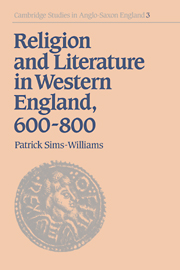Book contents
- Frontmatter
- Contents
- Preface
- List of abbreviations
- Map
- 1 Introduction
- 2 The kingdoms of the Hwicce and the Magonsætan
- 3 Paganism and Christianity
- 4 Early influences on the church
- 5 Varieties of monasticism
- 6 The eighth-century church
- 7 Biblical study
- 8 Letter-writing
- 9 The unseen world: the monk of Wenlock's vision
- 10 Prayer and magic
- 11 Milred, Cuthbert and Anglo-Latin poetry
- 12 The church in the landscape
- 13 Conclusion
- Bibliography
- Index
10 - Prayer and magic
Published online by Cambridge University Press: 20 October 2009
- Frontmatter
- Contents
- Preface
- List of abbreviations
- Map
- 1 Introduction
- 2 The kingdoms of the Hwicce and the Magonsætan
- 3 Paganism and Christianity
- 4 Early influences on the church
- 5 Varieties of monasticism
- 6 The eighth-century church
- 7 Biblical study
- 8 Letter-writing
- 9 The unseen world: the monk of Wenlock's vision
- 10 Prayer and magic
- 11 Milred, Cuthbert and Anglo-Latin poetry
- 12 The church in the landscape
- 13 Conclusion
- Bibliography
- Index
Summary
According to Ecgberht of York (d. 766), a priest ought to equip himself before his ordination with a psalter, lectionary, antiphonary, missal, baptismal order and martyrology. Only miserable remnants of such books survive, which give little more than glimpses of the public worship of the early Anglo-Saxon church. The surviving fragments of eighth-century Anglo-Saxon sacramentaries suggest that the liturgy then was mainly ‘Eighth-century Gelasian’ in character, that is, a Gallican modification of Roman usage. The nature of seventh-century worship is scarcely open even to conjecture. It would be wrong, for example, to imagine a simple opposition between ‘Roman’ influences from Canterbury and Irish' influences from Northumbria, for we know that Gregory the Great had encouraged Augustine to be eclectic in his use of the available Roman and Gallican liturgies, and that Northumbria was an influential centre in the dissemination of Roman chant. Churchmen and books were too mobile for simple geographical or ethnic generalizations to be viable. A case in point is Putta, bishop of Rochester, who had learnt the technique of chanting more Romanorum from Gregory's disciples: after the destruction of his cathedral in 676 he retired to Mercia and went about giving instruction in church music (ecclesiae carmina) wherever he was asked. (Some have supposed that he became bishop of the Magonsætan, which is unlikely.)
The area studied in this book was already under a variety of external influences in the seventh century. These probably affected the public worship of the churches, although deductions are difficult.
- Type
- Chapter
- Information
- Religion and Literature in Western England, 600–800 , pp. 273 - 327Publisher: Cambridge University PressPrint publication year: 1990
- 1
- Cited by



